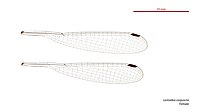
Griseargiolestes albescens is a species of Australian damselfly in the family Megapodagrionidae. It is commonly known as a coastal flatwing.

Lestoidea is a genus of damselflies in the family Lestoideidae, commonly known as bluestreaks. Its species are endemic to north-east Queensland, Australia, where they inhabit rainforest streams.
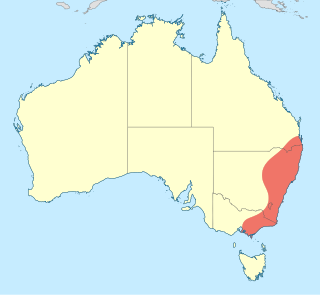
Cordulephya montana is a species of dragonfly of the family Cordulephyidae, commonly known as the mountain shutwing. It inhabits streams in eastern New South Wales, Australia.

Agriocnemis rubricauda is a species of Australian damselfly in the family Coenagrionidae, commonly known as a red-rumped wisp. It is a small damselfly; the male has a red end to his tail. It has been recorded from northern Australia where it inhabits boggy seepages and swamps.

Archibasis mimetes is a species of damselfly in the family Coenagrionidae, commonly known as a blue-banded longtail. It is a medium-sized damselfly; the male is bright blue and black. It has been recorded from New Guinea and northern Australia, where it inhabits streams.

Austrocnemis maccullochi is a species of damselfly in the family Coenagrionidae, commonly known as a tiny longlegs. It is a tiny damselfly, bronze-black in colour with very long legs. It occurs across coastal northern Australia and New Guinea, where it inhabits still waters.

Coenagrion lyelli is a species of damselfly in the family Coenagrionidae, commonly known as a swamp bluet. It is a medium-sized damselfly, the male is bright blue with black markings. It is found in south-eastern Australia, where it inhabits streams, pools and lakes.

Neosticta canescens is a species of damselfly in the family Isostictidae, commonly known as a southern pinfly. It can be found in eastern Australia, where it inhabits streams.

Austrolestes insularis is an Australian species of damselfly in the family Lestidae, commonly known as a northern ringtail. It is widespread across northern Australia, where it inhabits streams, pools, and ponds.
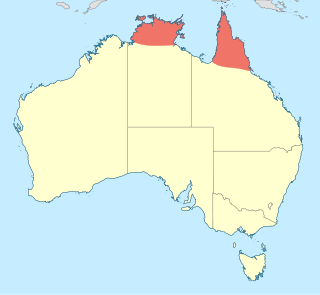
Indolestes alleni is a species of damselfly in the family Lestidae, commonly known as a small reedling. It is found across northern Australia where it inhabits lagoons, ponds and swamps.
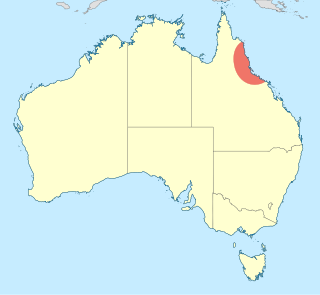
Diphlebia hybridoides is a species of Australian damselfly in the family Lestoideidae, commonly known as a giant rockmaster. It is endemic to north-eastern Queensland, where it inhabits streams in forests.

Lestoidea barbarae is a species of Australian damselfly in the family Lestoideidae, commonly known as a large bluestreak. It has only been recorded from the vicinity of Wooroonooran National Park, in north-east Queensland, where it inhabits streams in rainforest.

Austroargiolestes alpinus is a species of Australian damselfly in the family Megapodagrionidae, commonly known as a New England flatwing. It is endemic to north-eastern New South Wales, where it inhabits streams and bogs.

Austroargiolestes chrysoides is a species of Australian damselfly in the family Megapodagrionidae, commonly known as a golden flatwing. It is endemic to south-eastern Queensland, where it inhabits streams in rainforest.
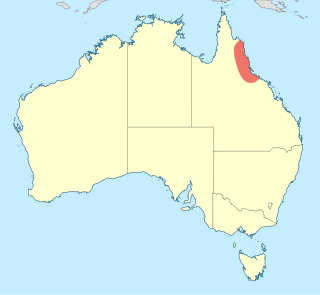
Austroargiolestes aureus is a species of Australian damselfly in the family Megapodagrionidae, commonly known as a tropical flatwing. It is endemic to north-eastern Queensland, where it inhabits streams in rainforest.
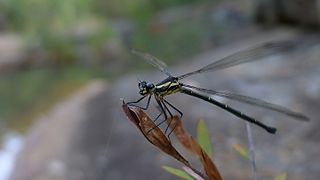
Griseargiolestes eboracus is a species of Australian damselfly in the family Megapodagrionidae, commonly known as a grey-chested flatwing. It is endemic to eastern Australia, where it inhabits bogs.

Griseargiolestes fontanus is a species of Australian damselfly in the family Megapodagrionidae, commonly known as a springs flatwing. It is endemic to south-eastern Queensland and north-eastern New South Wales, where it inhabits streams near their springs.

Griseargiolestes intermedius is a species of Australian damselfly in the family Megapodagrionidae, commonly known as an alpine flatwing. It is endemic to alpine areas of Victoria and New South Wales, where it inhabits bogs and seepages.

Episynlestes albicauda is a species of Australian damselfly in the family Synlestidae, commonly known as a southern whitetip. It is endemic to south-eastern Queensland and north-eastern New South Wales, where it inhabits streams and pools in rainforests.

Synlestes selysi is a species of Australian damselfly in the family Synlestidae, commonly known as a forest needle. It is endemic to eastern New South Wales and eastern Queensland, where it inhabits streams.


